Related Research Articles

Gene Francis Alan Pitney was an American singer, songwriter and musician.

From Luxury to Heartache is the fourth album by the British pop group Culture Club, released in April 1986. It was the last studio album released by Culture Club until 1999's Don't Mind If I Do.

Howard Greenfield was an American lyricist and songwriter, who for several years in the 1960s worked out of the famous Brill Building. He is best known for his successful songwriting collaborations, including one with Neil Sedaka from the late 1950s to the mid-1970s, and near-simultaneous songwriting partnerships with Jack Keller and Helen Miller throughout most of the 1960s.
"I Really Don't Want to Know" is a popular song written by Don Robertson (music) Howard Barnes (lyrics). The song was published in 1953.
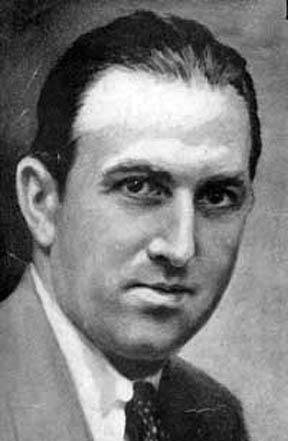
Billy Hill was an American songwriter, violinist, and pianist who found fame writing Western songs such as "They Cut Down the Old Pine Tree", "The Last Round-Up", "Wagon Wheels", and "Empty Saddles". Hill's most popular song was "The Glory of Love", recorded by Benny Goodman in 1936 and by Peggy Lee, Otis Redding, Paul McCartney, and others.
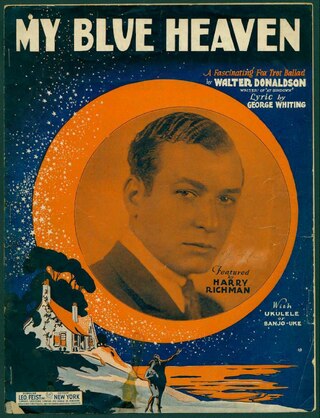
"My Blue Heaven" is a popular song written by Walter Donaldson with lyrics by George A. Whiting. The song was used in the Ziegfeld Follies of 1927. It has become part of various fake book collections. Its musical composition entered the public domain on January 1, 2023.
Sylvia Dee was an American lyricist and novelist best known for writing the lyrics to "Too Young", a hit for Nat King Cole, "The End of the World", a hit for Skeeter Davis and "Bring Me Sunshine", which was Morecambe & Wise's signature tune.
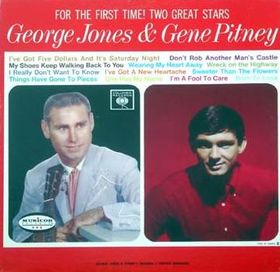
For the First Time! Two Great Stars – George Jones and Gene Pitney is an album by American country music artist George Jones and pop artist Gene Pitney. It was released in 1965 on the Musicor label in the United States and on the Stateside label in the United Kingdom.

Sings from the Heart is the 1962 country music studio album released by George Jones in June 1962. The album was his eleventh studio LP release, and was his last with Mercury, after switching to United Artists in late 1961. The album's theme was listing of songs about the heart, and contains his last #1 with Mercury Records from 1961, Tender Years.

"Only Love Can Break a Heart" is a popular song from 1962, performed by the American singer-songwriter Gene Pitney. The song was written by Hal David (words) and Burt Bacharach (music) and appears on Pitney's second album Only Love Can Break a Heart.

Wally Gold was an American musician, singer, songwriter, record producer, and music business executive from Teaneck, New Jersey.

"Lipstick on Your Collar" is a song written by Brill Building staff writers Edna Lewis (lyrics) and George Goehring (music) which was a 1959 hit single for Connie Francis.
"It Hurts to Be in Love" is a song written by Howard Greenfield and Helen Miller which was a Top Ten hit in 1964 for Gene Pitney. It was one in a long line of successful "Brill Building Sound" hits created by composers and arrangers working in New York City's Brill Building at 1619 Broadway.
Helen Miller was an American songwriter. She collaborated with several lyricists, notably Howard Greenfield in the early 1960s, and with him wrote several pop hits, including "Foolish Little Girl" by The Shirelles, and "It Hurts To Be In Love" by Gene Pitney.

Only Love Can Break a Heart is the second album by songwriter and recording artist Gene Pitney, released on the Musicor label in 1962. It included the top 10 hits "Only Love Can Break a Heart" (#2) and "(The Man Who Shot) Liberty Valance" (#4), which was written for but not ultimately used in, the film of the same name. Three other singles from the album also charted; "Half Heaven-Half Heartache" at #12, "True Love Never Runs Smooth" at #21, and "If I Didn't Have a Dime" at #58.
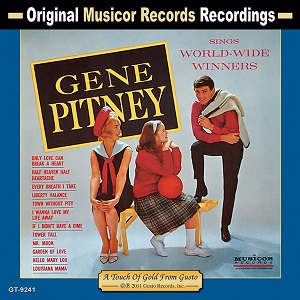
Gene Pitney Sings World Wide Winners is American singer Gene Pitney's fourth album, released on the Musicor label in 1963. The album mainly comprised material released on Pitney's first two albums, plus two non-album single tracks: "Louisiana Mama" and "Mr. Moon, Mr. Cupid & I", and one previously unreleased track: "Garden of Love".

Gene Pitney's Big Sixteen is American singer Gene Pitney's seventh album, released on the Musicor label in 1964. The album contains a mix of hit singles and album cuts from Pitney's early records.
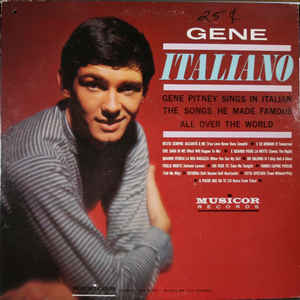
Gene Italiano is American singer Gene Pitney's eighth album, and first foreign language album, released on the Musicor label in 1964. The album features a number of Pitney's biggest early hits recorded in Italian, including "Twenty Four Hours From Tulsa", "Town Without Pity" and "Only Love Can Break a Heart".

It Hurts to Be in Love is the fourth studio album from American singer and songwriter Dan Hartman, released by Blue Sky in 1981. It was produced by Hartman and mixed by Neil Dorfsman.
"Half Heaven – Half Heartache" is a song released by Gene Pitney in 1962. The song spent 12 weeks on the Billboard Hot 100 chart, peaking at No. 12, while reaching No. 4 on Canada's CHUM Hit Parade, and No. 5 on Billboard's Middle-Road Singles chart.
References
- 1 2 3 4 5 6 7 8 "George Goehring, pop song composer known for ‘Lipstick on Your Collar,’ dies", Baltimore Sun, September 3, 2024.
- ↑ "George Goehring: He Put The Beautiful Music To The Words Of 'Half Heaven Half Heartache," by Dave McGrath, Gene Pitney Fan Newsletter, September 2001.
- ↑ Decca 9-29477 7" 1955 US https:/discogs.cxom
- ↑ ℗ A Verve Label Group Release; ℗ 1956 UMG Recordings, Inc.https://www.youtube.com/watch?v=ZMEfrNnGdy8
- ↑ Mercury 71184X45 7", Styrene 1957 US, discogs.com
- ↑ Baltimore Sun 19 June 1982 "Eyes Only" by Laura Charles p.E5
- ↑ "Geoorge Goehring: He Put The Beautiful Music To The Words Of 'Half Heaven Half Heartache," by Dave McGrath, Gene Pitney Fan Newsletter, September 2001.
- ↑ "Connie Francis Songs • Top Songs / Chart Singles Discography • Music VF, US & UK hits charts". Musicvf.com. Retrieved 26 April 2021.
- ↑ Roberts, David (2006). British Hit Singles & Albums (19th ed.). London: Guinness World Records Limited. p. 212. ISBN 1-904994-10-5.
- ↑ Mercury 72117 1963, https://www.discogs.com/release/3817562-Diane-Ray-Please-Dont-Talk-To-The-Lifeguard
- ↑ Select Records, Inc. 45P-724, discogs.com
- ↑ RCA Victor LSP-3989 LP, Album 1968 US discogs.com
- ↑ George Goehring: He Put The Beautiful Music To The Words Of 'Half Heaven Half Heartache," by Dave McGrath, Gene Pitney Fan Newsletter, September 2001.
- ↑ ©1998 Schiller Publishing LTD, ASN 97-80739
- ↑ ”'My Life In The Brill Building'Rocks", by Heather Tanksley, April 8, 2007 gotfolk.com.